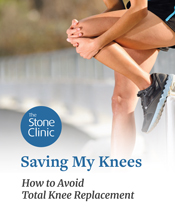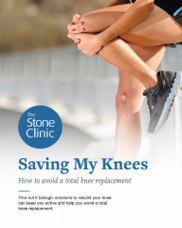ACL Reconstruction Rehab Protocol
General Considerations
- Progression should be based on careful monitoring by the Physical Therapist of the patient's functional status.
- Early emphasis on achieving full extension equal to the opposite side (including hyperextension within normal range, 10*).
- Avoid direct palpation and mobilization on incisions/portals for 4 weeks.
- Exercises should focus on proper patella tracking and recruitment of the Vastus Medialis Oblique (VMO).
- Exercises should focus on lumbopelvic stabilization in all planes of motion and all transfers.
- No resisted leg extension machines (isotonic or isokinetic) at any point in the rehab process.
- No cutting or twisting until cleared by Sports Test I.
- Patient should be well aware that healing and tissue maturation continue to take place for 1 year after surgery.
- Patients are given Sports Test I at 3 months , Sports Test II at 6 months, Sports Test III at 1 year.
Weeks 1 - 2
- Nurse appt on day 2 for dressing change and review of home program.
- Ice/elevation every 2 hours for 15 minutes to minimize edema and promote healing (please refer to Icing handout).
Manual
- Soft tissue treatment to quads, posterior musculature, suprapatellar pouch, popliteal fossa, iliotibial band and Hoffa’s fat pad. Extensive patellar mobilization.
- No direct scar mobilization x 4 weeks.
Exercises
- Seated edge of bed dangle for knee flexion; prop for knee extension.
- Quad sets/straight leg raises, hip abduction, calf presses, glut sets, and core exercises.
- Upper body conditioning, well-leg stationary cycling or Upper Body Ergometer.
- Gait training progression towards minimizing Assistive Devices (walker, crutches, etc).
Goals
- Range of motion: 0-90 degrees.
- Pain < 3/10. Minimal Edema.
- Gait weight-bearing as tolerated;
- Good quality gait with least amount of Assistive Device.
Weeks 2 - 4
- Nurse appt for suture removal on day 14.
- Walking for exercise for 15-20 minutes if no limp or swelling present.
Manual
- Continue with soft tissue treatment, effleurage for edema.
- Extensive patellar mobilization.
- No direct scar mobilization x 4weeks.
Exercises
Range of motion and functional strengthening exercises:
- Squats/Leg Press, Bridges/Hamstring Curls.
- 2” step up/down, intense core training.
- Aerobic exercises as tolerated (bilateral stationary bike, Elliptical, arm bike).
Goals
- Active range of motion equal extension to uninvolved side and flexion to 120 degrees. No edema. Full weight-bearing; normal gait without assistive device. Single leg balance 60 seconds on level surface.
Weeks 4 - 6
- MD appt at 4 weeks.
- Walk up to 1 hour for exercise.
Manual
- Continue with soft tissue mobilization. Apply direct scar tissue mobilization; can use instruments/tools.
Exercises
- Emphasize self stretching to both lower extremities.
- Increase intensity of resistance exercises (i.e. standing resisted squats, lunges, etc).
- Introduce eccentric exercises (4-6” steps).
- Increase single leg strength, challenge proprioceptive training.
Goals
- Full Range Of Motion equal to uninvolved leg.
- Perform 4 inch step down.
- Bike with minimal resistance for 20-30 minutes (in saddle), walking for 30 minutes, Elliptical, water-walking.
Weeks 6 - 10
Manual
- Soft tissue mobilization and joint mobilization as needed.
Exercises
- Add lateral training exercises (lateral step ups, lunges, step overs).
- Initiate tri-planar activities with the exception of closed-chain rotation (pivots).
- No cutting or pivoting.
Goals
- Activities should be pain-free:
- Able to descend stairs, double leg squat hold for >1 minute.
- Bike >30 minutes with moderate resistance, Elliptical with interval training, Flutter-style for swimming (no flippers, no breast-stroke kick).
Weeks 10 - 16
- MD visit at 3 months.
- Complete sports Test I and return to pre-running program at 3 months (see handout for specific details)
- Fit for functional knee brace if requested by MD.
- Incorporate bilateral, low level jumping exercises.
- Continue to increase strength, endurance, and add sport specific training drills.
Goals
- Pass Sports Test I.
Weeks 16+
- MD visit at 6 months.
- Sport test 2 at 6 months. Initiate return to run program.
- Implementation of jump training, agility training. Education of “at risk sports”.
- After 6 months add lateral plyometric type drills, agility ladder
Goals
- Initiate sagittal plane plyometrics, work towards single leg plyometrics. Clearance by MD and pass Sportsmetric training before returning to full athletics.
NOTE: All progressions are approximations and should be used as a guideline only. Progression will be based on individual patient presentation, which is assessed throughout the treatment process.

